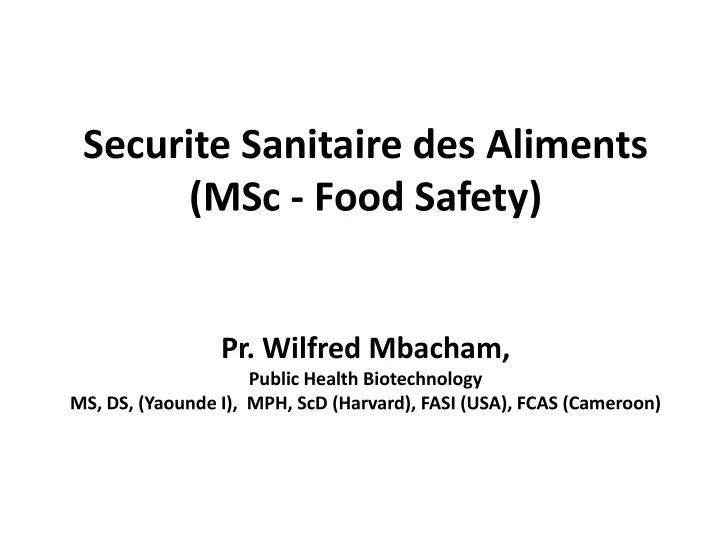

Securite Sanitaire des Aliments (MSc - Food Safety) Pr. Wilfred Mbacham, Public Health Biotechnology MS, DS, (Yaounde I), MPH, ScD (Harvard), FASI (USA), FCAS (Cameroon)
Quo va dis l’Afrique ? Renforcement de Capacite pour le Developpement • Proactive Model Use of Knowledge for better understanding • Reactive Model Application of knowledge
Considerations of use? No Yes Quest for fundamental understanding ? Pure basic Use-inspired Yes Yes research basic research Louis Niels Pasteur Bohr Research that Pure applied systematizes No No research particular Thomas phenomena Roger Tory Peterson Edison No Yes Courtesy of Olumide Ogundahunsi
Le Context de la CEMAC: UYI - 3 Missions – 3 Strategies TEACHING RESEARCH DEVELOPMENT INCENTIVE LINKS WITH LOCAL CONSOLIDATE TEACHER WELFARE PROGRAMS NGOs, INDUSTRY EMERGING DISCIPLINES AND LINKS TO PROFESSIONALIZE VOCATIONALIZATI DEVELOPMENT ON OF THE LMD INTERNATIONAL THEMATIC SYSTEM MODERNISE COLLABORATION
Les Objectives L’enseignement proposé aura donc pour objectifs de former des spécialistes de la sécurité sanitaire des aliments. Il comportera cinq séquences : • disciplines scientifiques et technologiques ; • outils du contrôle de la qualité ; • enseignements spécialisés ; • enseignements complementaire et un practicuum • stage en entreprise
3 Specialites Entry Requirement Employment Opportunities Doctor in Veterinary (DVM) Food Inspection and Certification Food BSc in Veterinary and Management of food safety lab, set up of SME, Assurance Aquatic Engineering Sciences, Assist lab prepare for Inspection Assist DVM in their duties BSc in Biochemistry, Chemical Food safety lab, management of nutrition services, Pathology, Toxicology creation of diagnostic lab, SME, vet research lab, QC officer is food processing BSc in Animal Production, Self-employed animal forms, SME Veterinary Zoology Laboratory BSc in Microbiology,, Management of food safety lab, management of Science SME, Management of Vet diagnostic lab BSc. Food Technology QC officer is food processing, Management of SME BSc. Biomedical Sciences, Safety Lab, SME, Epidemiology Intelligence Service LLB in Law, BA in Veterinary Policy/Regulatory Boards/Market Research Expert Sociology/Anthropology Public Health
Structuration des modules mensuels Week 1 Week 2 Week 3 Week 4 Week 5 Item Lectures Personal Tutorials/ Practicuum Total Work Complimentary Courses/Practicals 5 Credits 30H 60H 30H 30H 150 Course Month Course Title Lectures Alternates code Foodborne Disease October SA401 November SA403 Industrial Biochemistry Food Allergy and Intolerance December SA405 Hazard Analysis and Critical Control Point (HACCP) Development January SA405 February SA407 Research Methods in Food Safety
Structuration des modules mensuels Epidemiology and Statistical March SA402 Methods in Food Analysis April SA404 Audit and Management May SA406 International Food Law June SA408 Food Safety Management Project Development and July SA410 Implementation Analysis August – Exams and Holliday Governance and September SA412 Entrepreneurship
Les cours complementaires Option Code Course Lecturer Alternate Food Assurance SA529 Socio-Anthropology SA531 Epidemiology SA533 Chemical Pathology Food Safety laboratory SA535 Verterinary Science Science SA537 Animal Production SA529 Social Anthropology Veterinary Public Health SA535 Verterinary Science SA537 Animal Production SA533 Chemical Pathology
Les cours de specialisation Inspection and Certification: Agro System and SA501 Performance Measurements Food Safety laboratory Science : Molecular Detection October SA503 Methods in Food Biotechnology Veterinary Public Health: Regulatory Bodies – FDA SA505 Inspection and Certification: Information Systems SA511 Food Safety laboratory Science : Bioinformatics SA513 November Veterinary Public Health: Knowledge Translations and SA515 Policies Inspection and Certification: Monitoring and SA521 Evaluation of the Food Systems Food Safety laboratory Science: Epidemiology and December SA523 Zoonoses -M bovis and B bovis Veterinary Public Health: Decision Making and SA525 Communication
Guide d’Enseignements • Tous les cours se fait en diapo powerpoint • Le 1e diapo porte le titre et nom de l’enseignant • Le 2e le plan du cour • Le 3e les objectives d’enseignements • Les 3 derniers diapos comprenent: – La conclusion ou message a retenir – Les references biblio ou webographiques et liens internets – Les remerciements divers y inclus les sources des diapos • Tous les cours doivent etre accompagne de 2 documents en pdf relatif au cour • Les cours doivent se faire de mannier participative
Remerciements • EDULINK LIVE/Union Européen • Universités Italiens a travers l’ Univ. Udine - Coordonnateur • Universités de la CEMAC – Tchad – Cameroun – Gabon – Guinée Equatorial • Les developpeurs du curriculum – Dr Adiogo – Dr Abega Olama – Dr Tange Emmanuel – Wilfred Mbacham, ScD
Recommend
More recommend